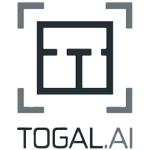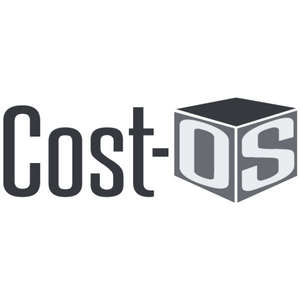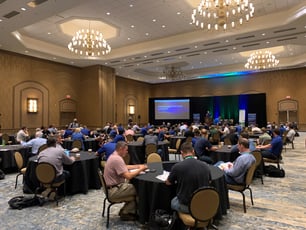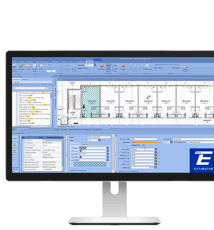How Technology Shaped Preconstruction in 2024
The preconstruction industry has been slower than others when it comes to the adaptation of tech developments. But over the span of 2024, more tech advancements within precon have happened than we’ve seen in a long time.
We interviewed Stewart Carroll, Chief Customer Officer at Beck Technology, on how he’s seen artificial intelligence, partnerships, data security, prefab and platform fatigue play out through the span of this year, and he had some great insight.
AI
Artificial intelligence hasn't been one of those “things” that we just throw into our lives and move on with it.
Its mass introduction in 2023 was revolutionary to many industries but had many estimators scratching their heads. Many questioned how AI would play a role within preconstruction and even more thought it would have no value at all when it came to construction estimating or were concerned that the introduction of AI was going to replace the estimator.

Our industry tends to be slower to adopt new tech than the consumer market because there is specific, detailed orientation to ensure the safety and accuracy of each estimate because it’s not just money on the table, it’s industry standards, laws and regulations, and company trust that we cannot so easily risk.
Although, as an industry we haven’t even scratched the surface with embracing artificial intelligence, there has definitely been more exploration and better questions being asked about how precon can use it.
When we interviewed Stewart earlier in the year, he said he encouraged preconstruction teams to embrace AI and not shy away because AI can increase value within many industries.
Stewart says that throughout this year more teams are starting to experiment with dropping in project documents, scopes of work and contracts to explore what AI can do and how we can take advantage of it.
AI helps with automating mundane tasks like takeoff, analyzing data, and studying alternative building options while mitigating risk factors. That alone brings more cost certainty to estimators and owners.
Partnership 
When you choose a tech partner, you need to trust the people you’re “getting into bed with.”
Bringing value to customers is not just having a tool, it's having a trusted partner. And Beck Technology is here to say that we’ll hold your hand through implementation, and we’ll still be there for innovation.
It’s about a partnership and whether the partner is willing to work with you. And when it comes to platforming our solutions, our focus is customer feedback, and how we use that to build our system around that feedback.
Data Security
Fear of cyber-attacks and data leakage is a valid fear. One of the biggest blockers in adopting new technology that GCs report is the fear of data security.
However, certifications around the vendor, not choosing an offshore service provider, using a reputable vendor where you know that if an attack happens, your vendor can handle it, all adds trust and confidence that your data IS secure.
Prefab 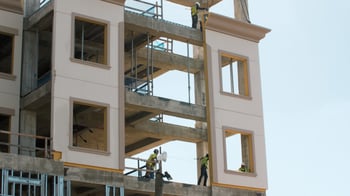
With the increasing popularity of integrated and collaborative building methods, preconstruction teams are coming to the table earlier in the life of a project and have a lot more control over design direction enabling GCs to take on less risk when considering prefabrication.
Companies like DESTINI Estimator users Brasfield & Gorrie are now asking the question of "should we own the production of the design?" Prefabrication can then become the outcome of that design production.
Stewart says, “If we do that, then we can prefab a lot more. Cost will go down, profits will go up, quality will go up, safety incidents will go down, and a lot more success comes with that.”
Platform Fatigue
When we last spoke to Stewart, he mentioned that it’s very important to not just change for change’s sake.
GCs have been more thoughtful when it comes to choosing their platforms and have now strayed away from using multiple tools for different processes.
.png?width=1000&height=563&name=%E2%80%9CWhen%20it%20came%20to%20looking%20at%20the%20estimating%20platform%20we%20knew%20we%20needed%20to%20move%20on%20from%20excel.%20What%20would%20make%20us%20better%20what%20would%20make%20us%20more%20efficient%20We%20evaluated%20a%20lot%20of%20different%20platforms%20we%20got%20in%20d%20(2).png)
When you pick one platform that does all the work instead of 10 different platforms, it reduces training costs, decreases your tech spend, simplifies the process for your team, removes silos of data, and connects the preconstruction with the construction phase.
The only challenge is that you’re now having to pick a vendor that does a lot more and risk putting all your eggs in one basket.
What’s Next?
Construction technology is undergoing a digital evolution. This begs the question—what will happen next? What other implementations will be a regular part of the preconstruction process and how will AI be incorporated even more in the future?
One thing’s for sure, precon is warming up to and welcoming change and tech adaptations now more than we’ve ever known.
If you would like to talk to us about how you can solve precon problems with our DESTINI platform, contact us here.

-1.png?width=112&height=112&name=image%20(4)-1.png)




